Can I take a tour of the Harvard campus?
Apr 15, 2024 • knowledge.
The Harvard University Visitor Center offers in-person tours daily. Additional tour offerings include the self-guided historical tour on the Visit Harvard mobile app, available to download on iOS and Android devices. During business hours you may purchase a Self-Guided Tour Map for $3 available in multiple languages.

Trending Articles
- What is the dress code for a Professional Education program?
- Does Harvard COOP offer a discount to Professional Education participants?
- Will I receive a physical certificate of completion after my Professional Education program?
- How should I list the Instructional Leadership Certificate (ILC) on my resume and/or LinkedIn?
- How can I apply for tuition assistance for my Professional Education program?
©2024 President and Fellows of Harvard College
Online Information Sessions
In these hour-long sessions, an admission officer and an undergraduate student will present information and answer questions about academics, student life, admissions and financial aid at Harvard College.
Registration Instructions
Online information sessions calendar and registration.
- Utility Menu
- Admissions Tour Guide
Eddie Nesmith ‘20
Concentration: Molecular and Cellular Biology House: Dunster Employer: Harvard Admissions and Financial Aid Office
Eddie knew he was meant for this job before he even had any experience with it - his bubbly and open personality was just that cut out for what the job’s responsibilities called for. “I never had a college tour experience as a high school student, but it’s just one of those things I knew I wanted - that wherever I ended up going to school, it was something that I would want to do.” And once hired as a tour guide for the Harvard Admissions Office, Eddie discovered that the role was everything he had hoped for and more.
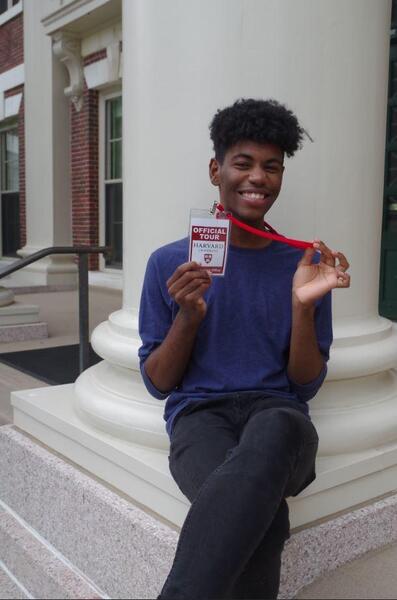
Reflecting on his time at Harvard, Eddie shares how it has been an incredible experience - one that he’s eager to share as tour guide with all the prospective students. “I’m really enthusiastic about my Harvard experience, and I find that this is a really good opportunity to share that experience. I talk about my friends and how much I’ve learned from them, how Dunster House is the best, about academics and my favorite professor Rob Lue and how he’s so corny. I love sharing how positive my Harvard experience has been.”
But more than that, Eddie believes it’s important to communicate an accurate representation of Harvard students and student life that dispels any assumptions about this school that prospective students may have. “I’m really excited about that process of sharing with prospective students, and dispelling preconceptions of Harvard students, and I’m just like ‘No, no, no. Everyone’s different.’ I would not classify every Harvard student under one stereotype. Everyone’s individual, everyone’s super friendly. We do do work here, but we have hobbies and interests and passions that are not necessarily academic, like yes, I want to Boston and get Panera and Ben & Jerry’s, so yes, we’re normal people as well, so I just like to convey that sentiment.”
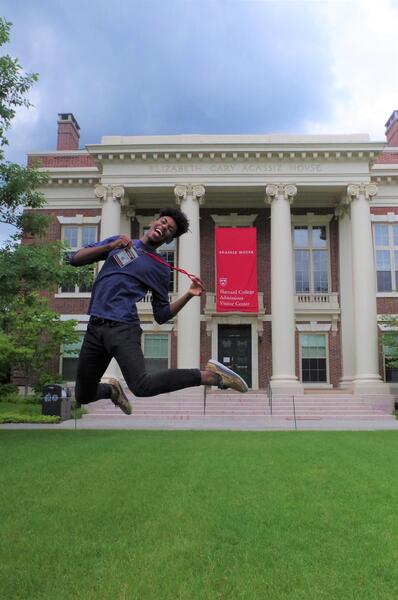
As Eddie sums up, he recommends that everyone should work as a tour guide for the Admissions Office, overbrimming with enthusiasm for the job. “I like my job a lot, and I actually enjoy it. I like to interact with people, I love talking to people, so like this was a perfect fit for me. I truly believe that you can make anything out of your experience at Harvard, and I get to share that. I feel like it has been a really positive experience for me, like in that respect, I enjoy talking to people about Harvard, but additionally, I feel like I’ve cultivated my own public speaking style, where I can be more comfortable presenting in general - I feel like it’s given me a life skill that I needed to ascertain.”
- Admissions Assistant
- Art Museum Assistant
- Building Manager's Assistant
- Career Services Assistant
- Children's Hospital Research Assistant
- Dorm Crew Captain
- HSA Managing Director
- HSA President
- Homeless Shelter Employee
- Law School Application Reader
- Office of Public Interest Advising Intern
- Pub Employee and Manager
- Receptionist
- Romance Languages Intern
- Shop Assistant
- Student Affairs Assistant
- Visitor Services Attendant
Visiting Campus
Planning to visit campus? We’ve gathered some information to help you plan your visit — virtually or in-person.
You can access the Harvard University campus map to explore campus yourself.
Campus Tours
Whether you want to explore campus from the comfort of your home or you’re ready to Cambridge, MA and see it for yourself, there are a number of options for touring the Harvard University campus.
Virtual Tours
In addition to exploring campus using the campus map , you can explore Harvard from home using our Virtual Tour . On this tour, you can discover spaces that aren’t included on in-person tours, such as classrooms, laboratories, and residence halls.
Check out more, topic-specific virtual tours on the Harvard University Visitor Center website.
In-Person Tours
The official Harvard tour departs from the Harvard Information Center, in the Smith Campus Center. The tour is student-led and includes a walk through Harvard Yard, an overview of the University’s history, and a unique view on the student experience.
The one-hour tour is free, but you do need to register in advance. Visiting parties are limited to groups of 5. For groups of 6 or more, please contact the Harvard University Visitor Center to arrange a visit.
You can view the Harvard University visitors calendar for more details.
If you are interested in touring the campus on your own, you can go on a self-guided tour using the Visit Harvard mobile app, available to download on iOS and Android devices.
Harvard Division of Continuing Education
The Division of Continuing Education (DCE) at Harvard University is dedicated to bringing rigorous academics and innovative teaching capabilities to those seeking to improve their lives through education. We make Harvard education accessible to lifelong learners from high school to retirement.

- Harvard Business School →
- Virtual Campus Tour
Admissions Events Admissions Events
Take a virtual seat in the case method classroom .
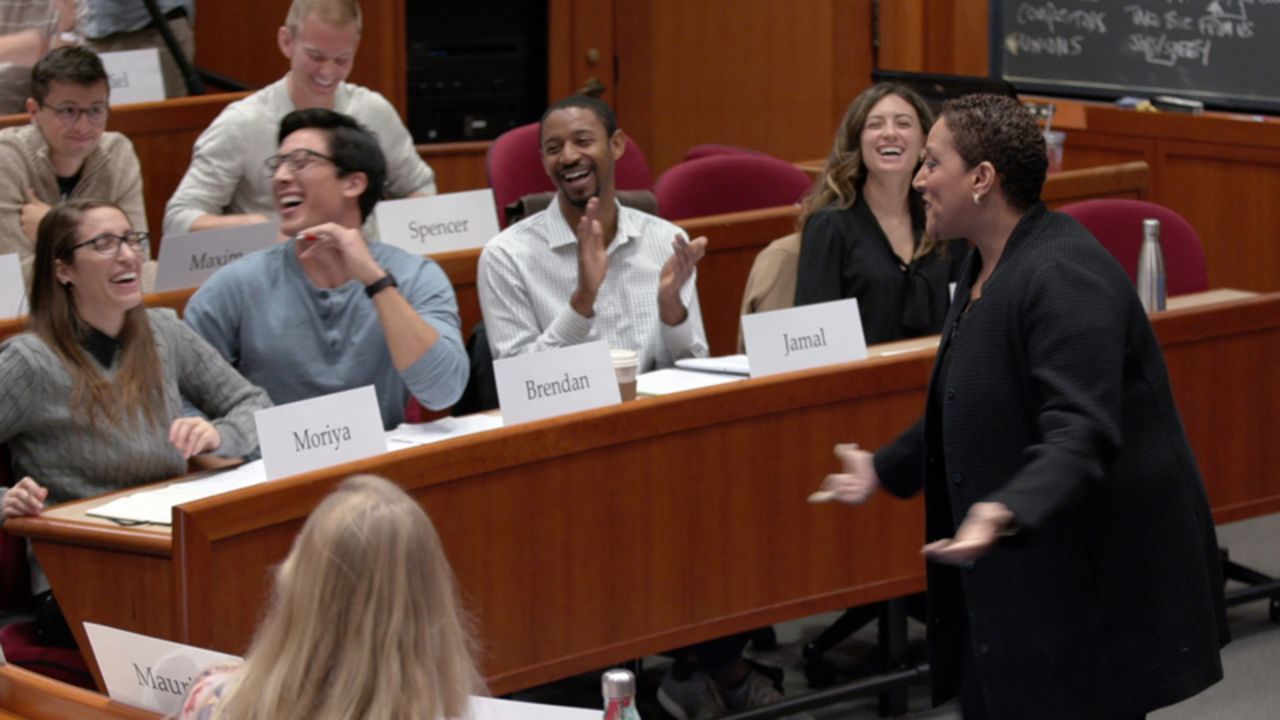
Pioneered by HBS faculty, the case method presents the greatest challenges confronting organizations and places the student in the role of the decision maker.

Take a Virtual Walk through our Residential Campus
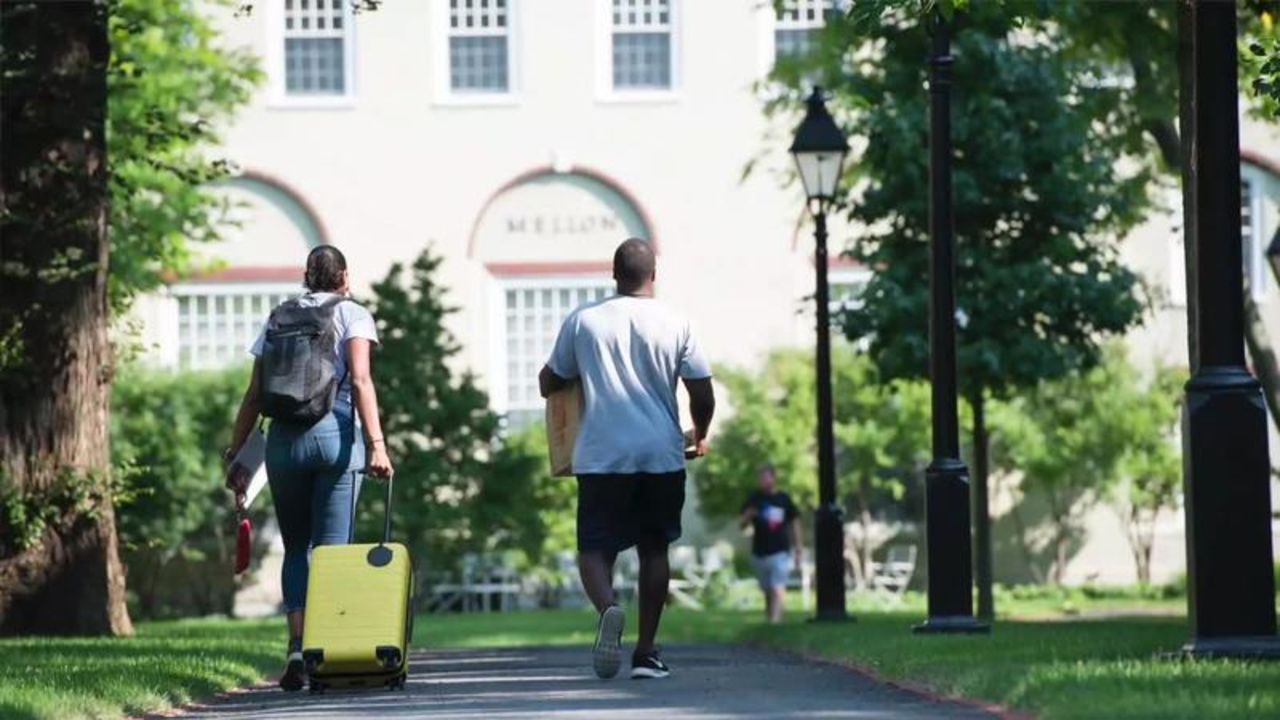
Learn how our students interact with our 40-acre campus.

Admissions Visitor Center
Campus tours and information sessions , class visit program, admissions events , student club conferences , campus map , get to know the area , keep hbs healthy.
Graduate profiles
Meet the class of 2024, harvard college.
Meet more Harvard College graduates

Isabella Madrigal
Isabella’s senior thesis screenplay, a genre-bending family drama full of magical realism, centers the issues of missing and murdered Indigenous women and girls, and two-spirit people.
Read more about Isabella
Dora Woodruff
Dora will next pursue a Ph.D. at MIT in algebraic combinatorics, a branch of mathematics that applies methods found in abstract algebra to discrete counting problems.
Aaron Shirley
Aaron dove into the world of medieval medicine with his thesis, “Holiness to Wholeness: Restoring Medieval Surgery to its Religious Cultural Context.”
Harvard Business School
Meet more HBS graduates
Davida Bynum
As a dual-degree candidate studying business and government, Davida is exploring the best ways to serve the public and private sectors.
Eduardo Avalos
With a focus on social entrepreneurship, Eduardo is hoping to create more equitable opportunities for those with fewer resources and less access.
Claudia Hill
By combining a degree in biomedical engineering with an M.B.A., Claudia plans to change millions of lives by creating life-saving drugs that can be distributed equitably.
Harvard Divinity School
Meet more Divinity School graduates
The growth I’ve experienced at HDS, both personal and academic, has been beyond anything I expected.” Samirah Jaigirdar Master of Theological Studies Learn more about Samirah’s studies
Jude Terna Ayua
Jude says his time at HDS changed his perspective about other faith traditions. After graduation, he will work as a private attorney and also run his non-profit, Keep Hope Alive Nigeria.
Christopher Siuzdak
While studying at HDS, Christopher’s favorite class was “Trends in World Christianity, 1900-2050,” which explored shifts in Christian confessions around the globe from a historical and social scientific perspective.
Harvard Extension School
Meet more Extension School graduates
Tomas Hernandez
Extension School graduate Tomas was able to complete his Master of Liberal Arts in Finance degree while working a full-time job, being a dad to three children, and pursuing his love of karate.
Vivien Kocsis
For her Master of Liberal Arts in Data Science capstone project, Vivien had a very specific sponsor in mind: NASA.
Brian Mazmanian
Of his journey at Harvard Extension School, Brian said, “I can honestly say that I’ve loved every minute of it.”
Harvard Graduate School of Design
Meet more graduates
For the first time, I truly felt like I was doing work that was very in touch with what GSD wants people to do, which is working with communities.” Priyanka Pillai Master in Design Engineering A joint Graduate School of Design and John A. Paulson School of Engineering and Applied Sciences program Learn more about Priyanka’s work
Harvard Graduate School of Education
Meet more School of Education graduates
Kavya Krishna
Kavya was recently named among Forbes’ “30 Under 30” for her dedication to empowering girls with the digital literacy skills necessary to excel in a technology-driven society.
Alria and Vyankatesh Kharage
Alria and Vyankatesh met as undergraduates, fell in love, and began building a life together when their shared passion for education brought them to Harvard.
Moriah has turned her own struggles with sobriety and recovery into an opportunity to help others seeking higher education opportunities.
Harvard John A. Paulson School of Engineering and Applied Sciences
Meet more SEAS graduates
Ben Schroeder
During his internship at SpaceX, Ben talked to experts to help him finalize his design for a robotic hand to help astronauts perform tasks remotely without the fatigue imposed by a suit glove.
Maria Emilia Mazzolenis
While pursuing a master’s degree in data science, Maria always kept her focus on the responsibility and impact that technology can have on society.
Lachlain McGranahan
Whether on the Charles River as a skipper on the Harvard Crimson sailing team or on the ocean helping to decipher sperm whale communications, Lachlain was never too far from his love for water and engineering.
Harvard Griffin Graduate School of Arts and Sciences
Meet more GSAS graduates
Thomas found a way to identify otherwise unrecorded 20th-century hurricanes, laying the foundation for a new field of historical environmental seismology.
Dylan Renaud
Dylan’s Harvard Horizons project combines research in the emerging field of nanoscale photonics—how light interacts with very small objects—with practical computing applications to create novel devices that move information via light.
Juhee Kang, who studied history and East Asian languages and civilizations, explored how psychological testing and mass data collection evolved in 20th-century Japan, where they became central across society.
Harvard Kennedy School
Meet more Kennedy School graduates
Ananya Chhaochharia
While pursuing a Master in Public Policy, Ananya learned how to turn a political campaign into an art form.
Adebayo Alonge
After founding a platform that provides safe pharmaceuticals in Kenya, Nigeria, and Uganda, Adebayo decided to pursue a mid-career master’s degree to help him understand how to expand to even more countries.
For her capstone research project, Maya sought to understand and find solutions for the inequality in Boston’s core city services, which aren’t equitably distributed across its diverse neighborhoods and communities.
Harvard Law School
Meet more Harvard Law graduates
Nicholas Gonzalez
Nicholas was instantly smitten with the law when he took part in mock trial and moot court competitions in high school. The performative part of arguing a case felt both familiar and alluring.
Phoebe Kotlikoff
After becoming one of the first female U.S. Navy submariners, Phoebe was inspired by the integration of submarine service and the repeal of “Don’t Ask, Don’t Tell” to attend law school.
Harvard Medical School
Meet more HMS graduates
I often tell students two things: ‘You can do it,’ and ‘but not alone.’” David Velasquez Doctor of Medicine Learn what inspired David to earn a third Harvard degree
Deborah Plana
Personal experience with cancer in her family cemented Deborah’s determination to pursue a career that combines her passions for analysis and improving patient care.
Mitchell Winkie
There are only a handful of residency positions in dermatology for the U.S. military each year. There was only one spot in the Navy open to graduating medical students, and Mitchell was selected to fill it.
It was an online search for “science internships, Boston” that set Irene on a 10-year path to Harvard where she would ultimately complete a Ph.D. in biological and biomedical sciences.
Harvard School of Dental Medicine
Meet more School of Dental Medicine graduates
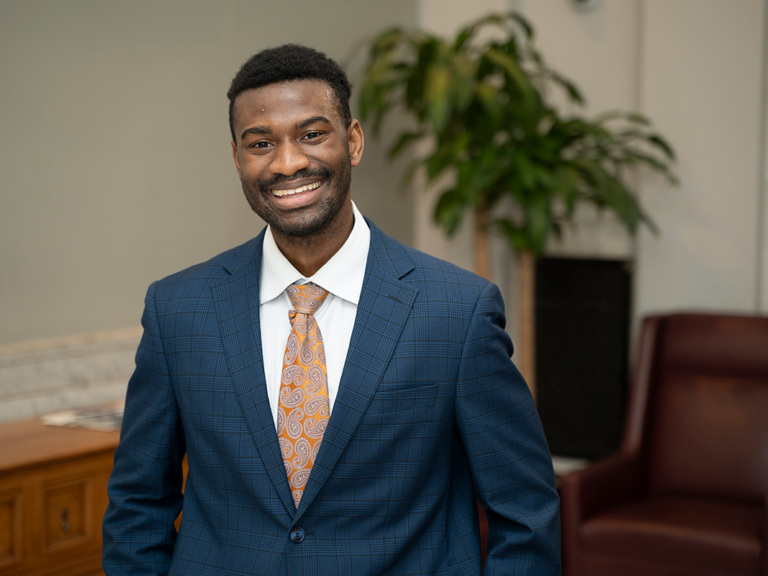

Sheridan Danquah
Growing up, Sheridan didn’t encounter a dentist until after moving from Ghana to the U.S. when he was 10. The experience made a profound impression on him and influenced him to enter the field.
Explore how Sheridan found his purpose
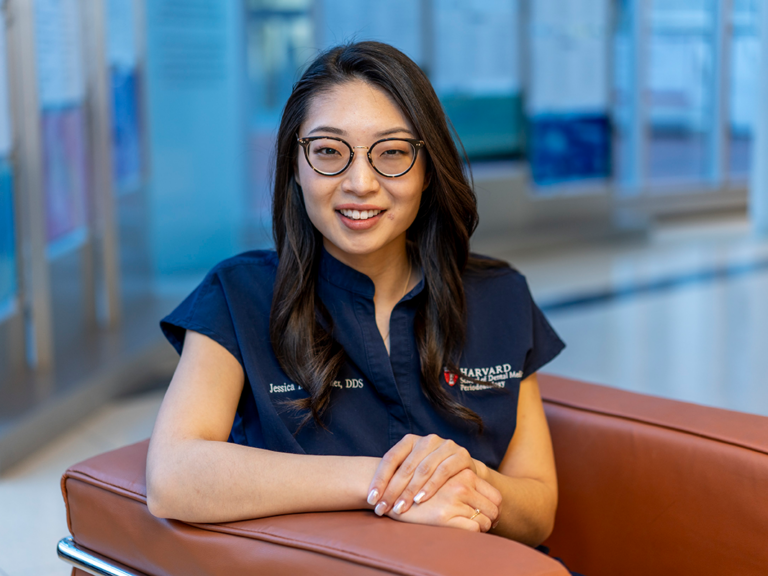
Jessica Latimer
Jessica turned a passion for doodling into a side job creating scientific illustrations that have landed in well-known medical and dental journals across the country.
Read about Jessica’s unique skill set
Harvard T.H. Chan School of Public Health
Meet more Harvard Chan School graduates
I heard of people who had given birth during their incarceration, and I was really shocked.” Bethany Kotlar, who studied the impact of maternal incarceration during pregnancy and after birth on child development Learn more about Bethany’s research
Irfan Chaudhuri
Watching his grandmother battle Alzheimer’s disease inspired Irfan to explore the role public health could play in Alzheimer’s prevention.
After navigating the roadblocks involved in gender-affirming care, Ivan founded the startup Trans Health HQ to decrease barriers for clinicians and patients.
James Frater
As a child with asthma, James saw the dangers that come from inadequate health care. That’s why he decided to gain the skills to understand health systems and improve health equity across the globe.
Maine Footy and SJC Launch College Compass Clinics for Aspiring Soccer Players
Educating for life.
Over 40 majors in undergraduate, graduate, and certificate programs.
- All Academic Programs
- Campus Degrees
- Online Degrees
- Library and Archives
- Lifelong Learning
- Student Resources
- Career Studio
- Honors Program
- Community-Based Learning
- Academic Calendar
- Technology-Enhanced Instruction
- Summer Programs
- Academic Center for Excellence
Find Your Fit
Saint Joseph’s offers a personalized education geared toward your future.
Admissions & Aid
Campus admissions.
- Admissions Requirements
- Tuition and Aid
- Cost Calculators
- Financial Aid
- Scholarships
- Meet The Counselors
- Paying Your Bill
- Deposit Now
- Admitted Students
- New Student Orientation
Online Admissions
- Costs & Billing
- Dates & Deadlines
- Transfer Requirements
We are community
Our campus is a resource for our neighbors, including pool use and cultural events.
- Community Overview
- Campus Life
- Dining Services
- Health & Wellness
- Safety & Security
- Campus Ministry
- Justice, Equity, Diversity, and Inclusion
Community Engagement
- Conference & Event Services
- Sustainability
Learn SJC’s Story
A rich tradition in Catholic education for more than a hundred years.
- About Us Overview
- History, Mission & Values
- Strategic Plan
- Contact Directory
- Centers and Institutes
278 Whites Bridge Road Standish, ME 04084
- Send an Email
- Get Directions
- General Inquiries: 855-752-4636
- Request Info
Latest News
- May 15, 2024 SJC Celebrates Class of 2024
- Admissions & Aid
- Life at SJC
- Monks Athletics
Learning for Life
Over 40 majors in undergraduate, graduate, and professional education programs
- Health Administration
- Social Sciences + Humanities
- Sport + Exercise Science
- Leadership for Sustainable Development
- Undergraduate
Academic Resources
- Student Administrative Resources
Welcome to SJC!
We make it easy to find your way into our community.
- Admissions & Aid Overview
- Campus Admissions Overview
- Schedule a Visit
- Tuition & Aid
- Online Admissions Overview
- Dates & Deadlines
We Are Community
Saint Joe’s is the place where student life and community life come together.
Student Life
- Student Life Overview
- Student Activities
- Residential Living
- Health & Wellness
- Safety & Security
- Community Service
- Plan an Event
- Community Programs
- Events Calendar
- Alfond Center
- Quick Facts
- History, Mission & Values
- Justice, Equity, Diverse, and Inclusion
College Resources
General Inquiries: 855-752-4636 Send An Email Get Directions Request Information Apply
- Prospective Students
- Parents & Families
- Current Community
Maine Footy and Saint Joseph’s College of Maine Launch College Compass Clinics for Aspiring Soccer Players
Media day scheduled for Friday, May 24 th featuring Maine Footy 2024 roster & coaches
Portland, Maine — Maine Footy, the 2023 Franchise of the Year in the United Women’s Soccer league, and Saint Joseph's College of Maine, are pleased to announce their new training program, College Compass Clinics, designed to redefine the landscape of soccer development programs for high school athletes. This collaborative initiative builds on the momentum of the Maine Footy franchise following the announcement of their 2024 roster and their first match of the season, and the shared commitment of both organizations to fostering leadership, community, and athletic excellence in student athletes.
The College Compass Clinics, exclusively designed for Maine Footy supporters who are high school players planning to compete this fall, will be hosted at Saint Joseph's College and led on the pitch and in the classroom by Maine Footy players who will draw on their experiences and share insights from their soccer journey.
These clinics will break new ground by transforming traditional ID camps into personalized 'My ID' clinics, which empower participants and their families to effectively navigate the college soccer experience; ranging from Division 1 to Division 3 teams to college club soccer to other opportunities to continue playing the game.
Scheduled to run from June 17 to June 21 at the campus along the shoreline of Sebago Lake, following the conclusion of the academic year, these one-day clinics will offer high school first years to seniors a rigorous and comprehensive soccer training experience. Each clinic will accommodate up to 60 participants, ensuring an optimal coach-to-player ratio for personalized attention and mentorship.
"Our partnership with Saint Joseph's College of Maine is a vital component of our vision to uplift and inspire young athletes by providing unparalleled access to top-tier training and educational resources," said Lizzie Hobbs, Head of Marketing for Maine Footy. "These clinics are more than just a training ground; they are a launching pad for the next generation of leaders both on and off the field."
Participants will engage in on-pitch training sessions led by distinguished Maine Footy alumni and current college soccer standouts. Following the physical training, the clinics will shift focus to classroom sessions where topics such as leadership, mental skills, athletic performance, and nutrition will be covered. Insights into college athletics and admissions processes will be provided by representatives from Saint Joseph's College, offering students practical tools to navigate the journey of becoming a college athlete. Saint Joseph’s College is a member of the NCAA Division III and the Great Northeast Athletic Conference , and offers 21 varsity sports programs including a top-ranked women’s soccer program.
“Across our athletic programs, Saint Joseph's is dedicated to making athletics an integral part of the educational experience and creating an opportunity for student-athletes to become well-rounded individuals through an emphasis on community, sportsmanship, and integrity,” said Will Rothermel, Associate Vice President & Chief Athletics and Recreation Officer at the college. “The College Compass Clinics extend this community to a younger generation of athletes, and we couldn’t be more excited to welcome them to campus and support their growth both on and off the field.”
The cost for attending these transformative clinics will be $125 with a $50 discount for owners of Maine Footy Supporters Badges (e.g. 2024 Season Supporter t-shirt, hat, or other badges). This initiative not only aims to enhance the athletic skills of young soccer players but also to foster their academic, personal, and career aspirations through a holistic approach to development.
Representatives of the media are invited to attend a Maine Footy media day on Friday, May 24 th at 4:00PM at the Hilton DoubleTree at 363 Maine Mall Road in Portland. Representatives from the Maine Footy franchise will be on-hand to share more about the launch, including coaches Will Pike and Chris Theodores, along with players leading the College Compass Clinics curriculum including Safia Paraiso, UK (playing experience with Wolverhampton Wolves), Anamari Bosnjak (playing experience with Croatian National Team), Noor Njeim (playing experience with Lebanese National Team), Anae Malbete (playing experience with PSG in Paris), Erika Haugen (Norway), Kaleigh Quinn (Colby College), Sally Rainey (player at University of New Hampshire), Sarah Peternel (player at Shepherd University), Jasmine Leshnick (player at Harvard University), Anna Rayhill (player at Harvard University), Willa Pratt (player at University of Delaware).For more information and to register for the College Compass Clinics, please visit our website and click on our Maine Footy Platform at www.mainefooty.com .
About Maine Footy:
Maine Footy, part of the FEAT Network and the reigning United Women’s Soccer Franchise of the Year, is dedicated to fostering community engagement, leadership, and excellence both in competition and beyond. Through innovative programs and partnerships, Maine Footy strives to be a catalyst for positive change and community development.
About Saint Joseph's College of Maine:
Saint Joseph’s College of Maine is where community grows - on campus, online, and around the world. Since its founding in 1912 by the Sisters of Mercy, the College has transformed learners into leaders who sustain their communities. SJC strives to be a diverse and inclusive community that forms individuals who practice humility, justice, and compassion, in solidarity with the marginalized. Student success is enriched by a lived mission and the practice of core values. Saint Joseph’s beautiful campus on the shores of Sebago Lake boasts over 40 undergraduate programs and a competitive Division III athletic program. Its pioneering online certificate, undergraduate and advanced degrees empower professional leaders in every corner of the globe. The BSN program at SJC is accredited by CCNE and the NECHE. Learn more at www.sjcme.edu .
Share This!
Related posts.

Dean's List Announced for Spring 2024 Semester

SJC Celebrates Class of 2024

Dean's List Announced for Fall 2023 Semester

"I can spend a week of my life and give to the people who need it most."
Campus program.
Is the SAT Still Needed?
- Posted May 17, 2024
- By Elizabeth Christopher
- College Access and Success
- Counseling and Mental Health
- Education Reform
- Higher Education Leadership
- Inequality and Education Gaps
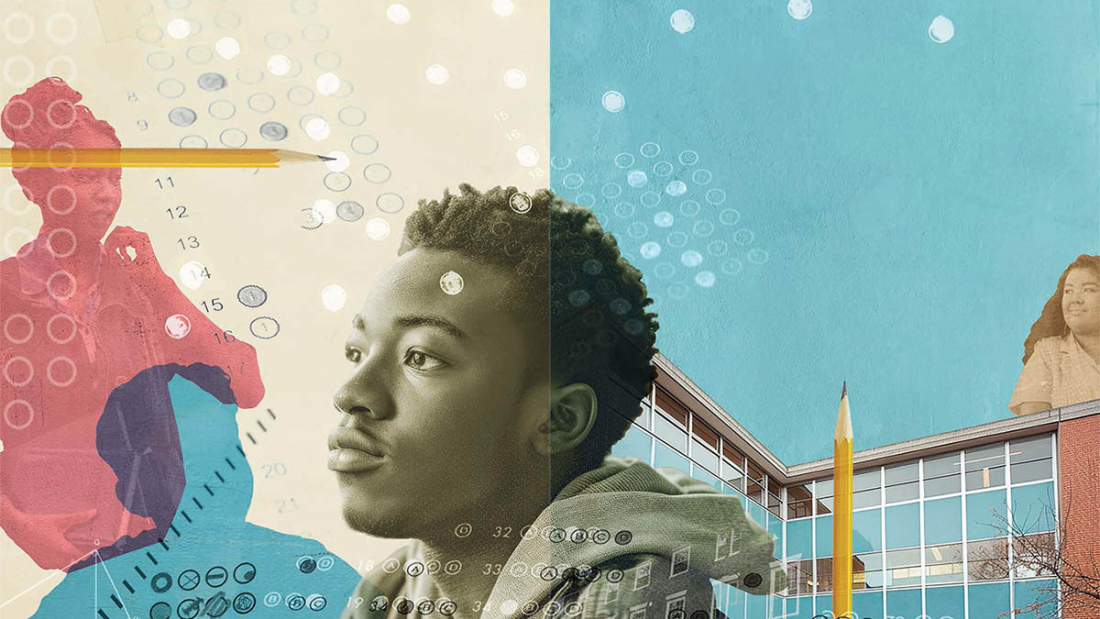
Sam Noel, a senior at Melrose High School in Massachusetts, didn’t sleep well the night before his SAT last spring. “I was nervous,” he says, not just about taking the college entrance exam but also about making it to the test center on time. When he searched online for a spot to take the test at his high school, or at any of the high schools in neighboring cities, the closest one he found was a 45-minute drive away.
Difficulty accessing test centers, a problem that reached its peak during the pandemic, is just one of the reasons colleges and universities have adopted test-optional admission policies. Another, and perhaps bigger reason, is the belief that making submissions of SAT or ACT scores optional is fairer and more equitable for students that come from less-advantaged backgrounds. Data shows that students from high-income families on average score higher than those who come from lower-income families. Recent research from Opportunity Insights, a team of Harvard-based researchers and policy analysts, which set out to examine if highly selective colleges perpetuate privilege across generations, reveals how wide the score gap is.
“One-third of the children of the very richest families scored a 1300 or higher on the SAT, while less than 5% of middle-class students did,” out of a possible 1600, according to the study. “Relatively few children in the poorest families scored that high; just one in five took the test at all,” The New York Times reported, citing the study.
This is where it gets complicated.
Some researchers say that, despite that sobering data, dismissing the SAT and tests like it is shortsighted. Harvard Professor Raj Chetty, part of the Opportunity Insights team, told The New York Times the disparities in SAT scores by class and race are a “symptom, not a cause,” of educational inequality in the United States. Moreover, researchers like Chetty say SAT scores can do a good job of identifying students who are better prepared to complete the rigorous course work of Ivy Plus institutions — the eight ivy league schools, plus others like MIT and Duke. This is true regardless of the income level of students’ families, Chetty says. This is, in part, the reason schools like Harvard, Brown, Yale, and Dartmouth College are returning to requiring standardized tests for undergraduate admissions. Dartmouth did its own study on the role of testing in its admissions process and concluded that, as its website reads, “a standardized testing requirement will improve — not detract from — our ability to bring the most promising and diverse students to our campus.”
Yet many people, including college admissions officers and high school counselors, say the benefits of making test scores optional in college admissions are too great to ignore. They feel that college admissions should be based on other aspects of a student’s application — the transcript, essay, letters of recommendation, and extracurricular activities. Today, more than 80% of colleges do not require applicants to submit standardized test scores as part of their college applications, according to Inside Higher Ed .
And, so, the question being asked is, is the SAT still needed?
______________
Students’ scores from the SAT, ACT, and standardized tests like them are “just not the main thing a lot of colleges are paying attention to,” says Jamiere Abney, Ed.M.’17, director of admissions at Western Oregon University. He feels that concerns about grade inflation are overblown and that a student’s transcript, GPA, essay, and letters of recommendations do a better job of helping admissions officers understand who the student is and what their potential for success is. Taken together, these components of a student’s record “give us a three- to four-year story of who you are academically and intellectually, not just at one moment in time,” Abney says.
If a student sees a test requirement or if they see that their score falls below the average scores of students attending that school, they may wonder, “is this a school that I can even have a chance at?” says Abney, who favors his school’s test-optional policy because it “gives students one less thing to worry about.” Encouraging lower-income students to apply is important, he says, because earning a college degree is still one of the surest paths to upward social mobility. Forty-seven percent of students at Western Oregon, the oldest public university in the state, are first-generation college students; some of them might have opted out of applying to college if it weren’t for its test-optional policy. “If testing is what’s turning people away, then we have to ask ourselves, ‘Is it really worth it?’”
In general, Clara Yom, Ed.M.’15, a high school counselor in Chicago, advises her students not to submit scores if that’s an option. “I usually tell them there should be a good reason you’re sending your SAT scores in with your application.” It’s rare for her to see an SAT score above 1200 and those scores just don’t reflect her students’ potential, she says.
Between 75% and 80% of the students at the high school where Yom works now are eligible to receive free and reduced lunch, and a large percentage of students identify as Black and Latino. The vast majority of students at her school aspire to go to college. “Personally, I think it’s impossible to get an SAT score above 1200 without ‘studying’ the SAT,” she says. “It’s not like you get straight A’s in your high school classes and you take AP English and then you’re guaranteed a high score on the SAT.” Rather, it’s about learning how to take the test well and that often depends on having parents who can pay for tutoring. Before becoming a high school counselor, Yom worked as an SAT tutor. Most of the students she tutored came from affluent families and were able to raise their scores 200 to 300 points after weeks of drills.
Others who welcome test-optional policies do so because it represents a shift away from what they feel is an overemphasis on personal achievement. It says, “loud and clear, that who you are as a person and the choices you have made are more important than one test,” says Brennan Barnard, the college admissions program adviser for Making Caring Common, an Ed School project that seeks to help schools develop empathy in students. Colleges and universities should be looking at alternative ways to assess students’ readiness for college, says Barnard, who is also director of college counseling at the Khan Lab School, a mastery-based school in California, and author of The Truth About College Admission . “If a student shows they can master calculus and tutor other students, doesn’t that say a lot more about who they are as a student and their potential to be successful than a test score?” he says.
But proponents of standardized testing say eliminating the SAT and ACT, at least for admissions to Ivy Plus schools, would be a mistake because research shows that the tests uncover students who are more academically prepared for rigorous coursework, including those who come from less-advantaged backgrounds.
“The SAT is a real lifeline for people who don’t go to elite high schools,” and who wouldn’t get noticed by admissions officers without those scores, says David Deming, a professor at the Ed School and the Harvard Kennedy School, as well as one of the authors of the Opportunity Insights study. This matters because attending an Ivy Plus school can have a significant impact on a student’s social mobility. “Attending an Ivy Plus instead of a flagship public college,” notes the study, “triples students’ chances of obtaining jobs at prestigious firms and substantially increases their chances of earning in the top 1%.”
However, the researchers also found that Ivy Plus institutions currently rely “too much” on non-academic attributes of a student’s application in their admissions practices and “are more than twice as likely to admit a student from a high-income family as compared to a low- or middle-income family with comparable SAT/ACT scores” because of their preferences for legacy applicants as well as for applicants with impressive extracurricular and athletic resumes. If these schools changed their admissions policies, the researchers say (to rely more heavily on SAT and ACT scores), then “Ivy Plus colleges could significantly diversify the socioeconomic backgrounds of America’s highest earners and leaders.”
As Deming says, “No one is suggesting only the highest-scoring students be admitted to Ivy League colleges,” as diversity also needs to be a priority. But that goal can sit alongside another priority, he says, which is to admit students who are ready to succeed and who can benefit the most from a challenging academic environment. To get there, Deming supports a system that includes the SAT in student assessment but that also makes some allowances for students who come from lower-income families and are first-generation college students. “I think we do have that system in a lot of ways,” he says. “Colleges do tend to put a thumb on the scale positively for low-income students who do well on the SAT. That’s just empirically true.”
The SAT is not perfect, says Deming, who believes test-taking practices that give the advantage to higher-income families should be eliminated. For example, he disagrees with “superscoring,” a practice which allows students who can afford to take the SAT or ACT multiple times to submit their highest scores without colleges knowing the number of times they took the test. But he maintains that “we should have some close-to-universally accepted standard of judging whether somebody is prepared to do rigorous college level work.”
And that works best when everybody takes the test, according to Professor Andrew Ho, president of the National Council on Measurement in Education. He’s a proponent of requiring the tests in college applications, but only if everyone were required to take it. He points out that in states that require public high school students to take the SAT or ACT to graduate, the pool of college applicants is more balanced demographically. The problem when the test is not required is that some students talk themselves out of taking the test and potentially out of the running for some schools and “the people who have the money and the time … get over-represented in the population” of college applicants, he says.
In 2007, Michigan began requiring its public high school students to take the ACT during their junior year, which the state offers for free during the school day. (Eleventh-graders in Michigan are now required to take the SAT. They are one of nearly a dozen states that have made the test mandatory.) As a result, the state saw small increases in college attendance, particularly among disadvantaged students. By mandating the test, wrote Professor Susan Dynarski in The New York Times in 2017, a significant number of low-income students who scored high enough to attend a selective college were discovered. “For every 1,000 students who scored well on the optional test, an additional 480 did so on the mandatory test,” she wrote.
As educators, researchers, parents, and students consider the question about whether the SAT is still needed, Ho says it’s important to remember that test scores are just one part of a five-legged stool that college admissions officers draw upon to make their decisions and believing the other legs of the stool — the personal essay, recommendation letters, student records, and extracurriculars — are fairer is wrong because there is more and more evidence that the wealthy have an advantage in those other areas. These advantages reflect deep-seated educational inequalities that begin to take hold long before a student takes the SAT, “including differences in school quality, neighborhood exposure, and many other environmental conditions,” according to Opportunity Insights. As Ho says, “Disparities in test scores reveal deep inequalities in educational opportunity, but removing the test does not remove the disparity.”
Regardless of whether SAT and ACT are required as part of undergraduate college admissions, the educational inequality the test reveals is something we want to fix, says Deming. And how to do that comes down to an established formula, which, he says, includes more resources, more time in school, early childhood education, smaller classes, highly qualified teachers, attention to the core curriculum, and not letting students fall behind, which requires testing. “We can’t fix a problem unless we can diagnose it,” says Deming. He would also like to see more testing to identify learning gaps at the state, district, school, and even grade and classroom level.
Part of the solution starts with changing how the public thinks about testing, says Ho. Tests like the SAT can be a tool for educational equity if we can break three fallacies, he says: “that test scores are more meaningful, more precise, and more permanent than they are.” Getting a low score doesn’t mean you can’t learn and thinking it does is damaging. Ho believes that educators are getting better about talking about how to interpret test scores in terms of asset frames versus deficit frames. In other words, “it’s not what you lack; it’s what you have and what you can do if we help. It takes good teachers, good educational systems, to remind people of this.”
Melrose student Sam Noel made it to his test on time and was relieved when it was over, he says. It turned out that none of the schools he applied to required him to submit his scores and he was happy to have the option to share his scores only with the schools where he thought they’d make a difference in his application.
Elizabeth Christopher is a writer based in Massachusetts. Her last story in Ed. focused on community college transfer challenges

Ed. Magazine
The magazine of the Harvard Graduate School of Education
Related Articles

The Future of DEI in Higher Education
The impact of the Supreme Court's decision to end race conscious admissions and the future of diversity work on college campuses
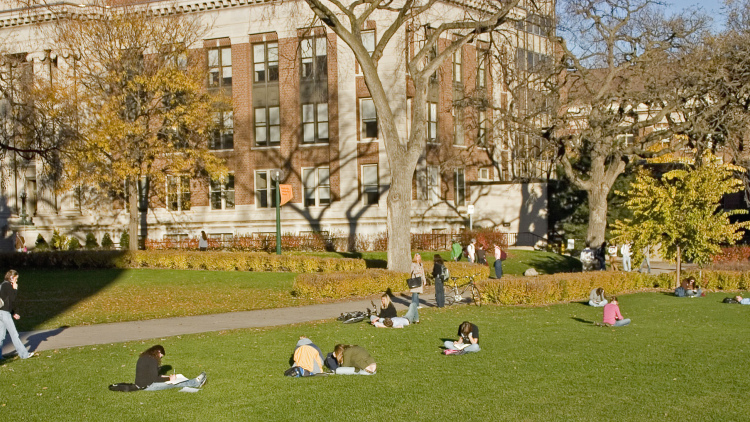
Making College Attainable
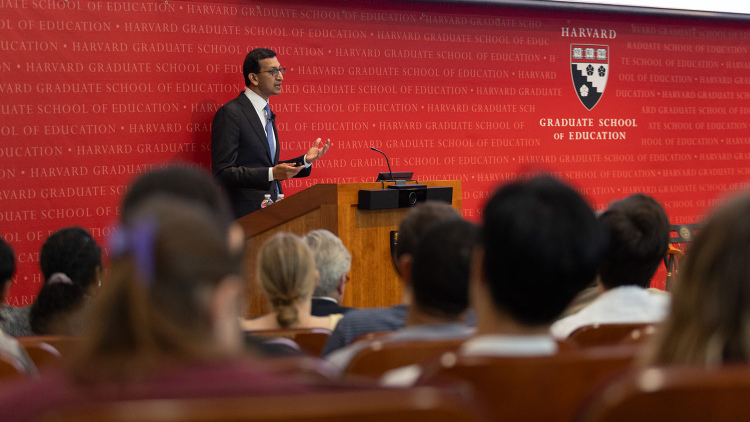
Askwith Education Forum Details Impact of Wealth on College Admissions
An eye-opening presentation sheds new light on elite admissions practices in higher education
SEAS Tours (Undergraduate only)
Take a student-led supplemental tour focused on Harvard’s undergraduate programs in engineering and the applied sciences (including applied mathematics, biomedical engineering, computer science, electrical engineering, engineering sciences, and mechanical engineering).
The tour, led by SEAS staff and students concentrating in the sciences and engineering, provides an overview of pursuing a technical degree in a liberal arts context, undergraduate research opportunities, related student groups and competitions, and support for entrepreneurship and innovation.
The SEAS tour will not cover the Harvard College (undergraduate) admissions process. To learn more about admissions and financial aid, please visit the office of Harvard College Admissions and Financial Aid . You may also attend the Harvard College general information session and tour .
Please note that registration is required for both the SEAS Tour and Harvard College Information Session & Tour so be sure to register as soon as you have a visit date in mind.
SEAS Summer tour dates will be posted in June 2024. Dates will run the last week of June through the first week of August.
Click here to register online for SEAS Tours through Eventbrite (A new link will be posted in June 2024 to register via the Eventbrite system).
- Cancellations: If you are no longer able to attend the tour, please cancel your registration via Eventbrite or email [email protected] with your name and order number with at least 48 hours notice.
Tour check-in takes place in the main entrance of the Science & Engineering Complex (SEC) located at 150 Western Ave, Allston MA 02134.
Public Parking
Public parking is available at metered spots on Western Ave. Parking meters run from one to two hours, and will take quarters only. SEAS cannot make change and does not maintain a supply of coins, so please bring quarters with you. A further advisory: Cambridge parking violations start at $25.00, and meters are monitored closely by transportation officers. We do not reimburse visitors for parking tickets.
Daily Parking Permits for Visitors
You may purchase a Daily Visitor Parking Permit online for Harvard garages on Oxford Street and Everett Street (weekdays only). You will need a printer to complete this transaction.
More Parking Information
Parking policies at Harvard are the responsibility of the Harvard University Parking Services , (617) 496-7827. For detailed parking information, please visit the Parking Services website at www.transportation.harvard.edu/parking .
We kindly ask that you do not bring additional guests beyond those that registered for your selected tour time. Any cancellation that is made is automatically designated to the next person on the waitlist, up until the start of the tour. All tours are capped at a certain level due to the availability of tour guides and the capacity for guests in the lab spaces which make it difficult to accommodate additional requests.
For more questions about SEAS undergraduate programs and visits:
Email: [email protected]
Phone: 617 495 3163
- Utility Menu
GA4 Tracking code

- General Info
- Events Schedule
fa55cdb4b25fd32cc551956de922b361
Commencement week at harvard university.
Guidelines and Ticket Information
Below is information about Yard access during Commencement week and on Commencement Day. Please read carefully to ensure you are prepared for your visit to the Yard, as Yard access is limited before Commencement Day.
Yard Access Prior to Commencement Day
Yard access through Wednesday, May 22, 2024 at 11am.
Ticketed guests of graduates may enter the Yard between 8am and 5pm accompanied by their graduate (with HUID) by showing their Commencement ticket. The exception to this is that on College Class Day, Wednesday, May 22, access to the Yard for all other guests will be limited to the hours of 8am-11am unless guests have a Class Day ticket.
- For graduating students who have scheduled photography within the Yard before Commencement Day, one photographer per student will be admitted to the Yard through the Widener Gate between the hours of 8am and 11am, upon signing in and being accompanied by a graduating student with a valid HUID.
- There are several memorable places for graduating students and guests who wish to take pictures or gather outside of Harvard Yard as well. To name a few, we suggest Memorial Hall, the Science Center Plaza, Harvard Stadium, the Harvard Art Museums, outside of the Harvard College Houses, Weeks Bridge, Radcliffe Quad, Baker Library, and Langdell Hall.
- Any media members, including professional photographers, are required to seek a media credential approved by Harvard Public Affairs to gain access to Harvard Yard and should identify themselves as members of the media. The college and each graduate/professional school host additional events unique to their community. Supplemental information about school programs and events will be shared by each school. Requests should be made to [email protected] .
Yard Access for College events on Tuesday, May 21 and Wednesday, May 22, 2024
- General admittance to the Yard for guests of graduating students will be limited prior to Tuesday, May 21st.
- Guests of graduates attending College ceremonies to be held in Memorial Church or the Tercentenary Theatre on Tuesday, May 21st and Wednesday, May 22nd, should show their ticket for Wednesday’s Class Day exercises to enter the Yard.
- The following gates will be open on Tuesday, May 21 and Wednesday, May 22, 2024*:
- Solomon (Lamont) - located on Quincy St.
- Widener – located on Massachusetts Ave.
- Meyer (Science Center) - Located on the Science Center Plaza near Cambridge St.
- *On Class Day (May 22), Boylston and Strauss will also be open starting at 11 AM - these are additional Mass. Ave. gates
- Guests using tickets on multiple days should ensure safekeeping, as tickets are required for re-entry on Commencement Day. Additional or replacement tickets are not possible.
Yard Access Guidelines for Commencement Day: Thursday, May 23, 2024
- Gates open at 6:45 AM and all guests should be seated by 8:30 AM.
- All guests must have a ticket to enter the Yard for Commencement Day exercises. Graduating students must have regalia and have both their lanyard and active Harvard ID to enter the Yard.
- HUIDs are not eligible for gate entry for the Commencement ceremony; gates will open for all active HUID holders after the ceremony concludes.
- Before entering Harvard Yard and throughout Commencement, all persons, bags, and personal items are subject to inspection. No backpacks of any type will be admitted. No bag or item larger than 12 x 12”x 6” will be permitted inside the Yard during events.
- The sale of Commencement tickets is strictly prohibited.
- A ticket grants admission into Harvard Yard but does not guarantee a seat; seating is available on a first-come basis and cannot be reserved. We encourage all guests desiring a seat in the Theatre to arrive early. Overflow seating is available in the Yard (near Lamont Library or Weld Hall) and just outside of the Yard in the Plaza Tent and Smith Campus Center. Also, most undergraduate Houses and graduate Schools also livestream the event.
- The Commencement Program may be viewed via live webcast on harvard.edu or Comcast 190 in metro Boston.
- Strollers are permitted only in the Old Yard and not in Tercentenary Theatre.
Guests with Access and Functional Needs
There is a reserved Accessible Seating section available for individuals with access and functional needs in Tercentenary Theatre on Commencement Day. Please note that this section is for disabled guests only and one companion. These guests will need to show an Accessible Seating ticket for access. Degree candidates are welcome to trade 1-2 general admission tickets for Accessible seating tickets at the time of their ticket pick up at their schools or Senior Desk, for College graduates. There is a limited number of these and they will be provided first-come, first served. However, there is ample overflow accessible seating in the Science Center Plaza Tent and Smith Campus Center.
School and Alumni Events
- The college and each graduate/professional school hosts additional events unique to their community. Supplemental information about school programs and events will be shared by each school.
- College Graduation Events | Harvard Alumni
Pete Walker & the GSD: Nearly 70 Years of Connections
For almost 70 years, the landscape architect Pete Walker (MLA ’57) has maintained strong ties with the Harvard Graduate School of Design (GSD), a relationship that has evolved alongside his career, from student to world-renowned designer and GSD benefactor. Since 2004, the Peter Walker & Partners Fellowship, conferred on Class Day, has supported travel for promising Landscape Architecture graduates.
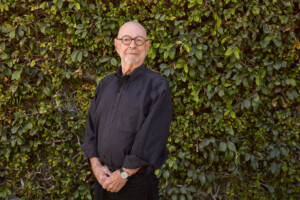
Walker’s introduction to the GSD dates to the mid-1950s when he was a graduate student at the University of Illinois, studying with the landscape architect Stanley White. After his first term, Walker asked his professor what courses to take the next semester. White’s response? “Well, you’re not going to be here,” Walker recalled. “You’re going to be at Harvard.” Indeed, White had arranged with his former student Hideo Sasaki, then a GSD faculty member in the Department of Landscape Architecture, for Walker’s transfer.
Encouraging Walker’s move east, White had characterized Sasaki as a mastermind—an assessment Walker would soon share. “Sasaki saw the future in a way that I had never even imagined,” Walker says. “He gave this view of the world—an incredibly dynamic postwar view, talking about transportation, expansion of education, corporate expansion, urban expansion, world trade, airplanes. . . . I had never thought of landscape in those terms, likely because no one had really described it like that. And Sasaki was just beginning to.” Walker was thus exposed, though his time at the GSD and in Sasaki’s office, to a perspective that broadened landscape architecture’s reach to an urban scale.
Walker graduated from the GSD with an MLA in 1957 and, funded by the school’s Jacob Weidenman Prize , undertook his first trip to Europe to visit the continent’s historic gardens. After returning home, he continued to work with Sasaki, cofounding Sasaki, Walker, and Associates (eventually the SWA Group), which soon added to its initial location in Watertown, Massachusetts, an office in San Francisco, with Walker at the helm. He left SWA in 1983, establishing a small practice with his then-wife and partner Martha Schwartz (currently Research Professor in Practice of Landscape Architecture at the GSD). Since then, the firm has undergone a series of iterations culminating in Peter Walker and Partners, which now operates as PWP Landscape Architecture .
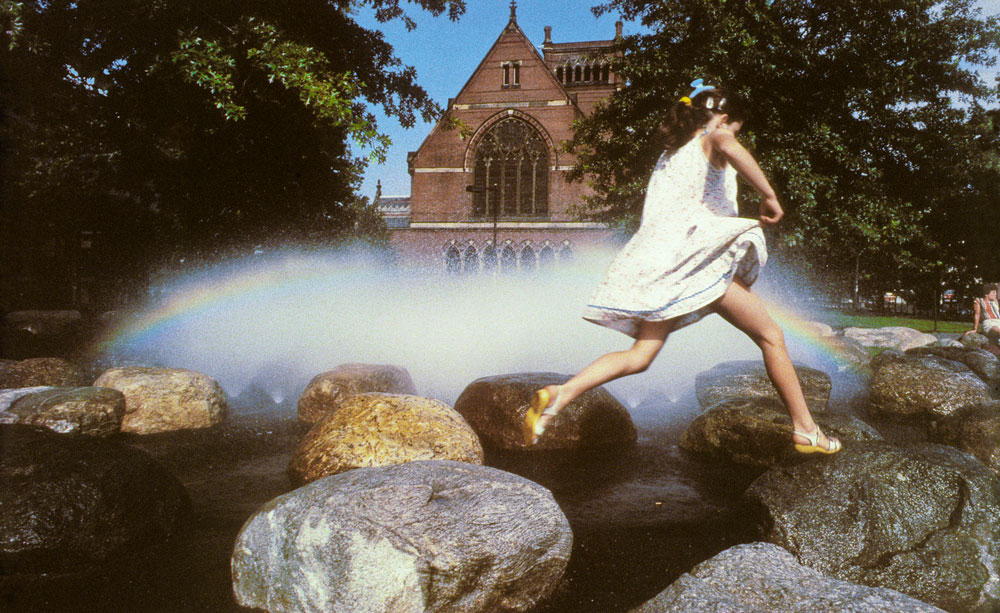
In the midst of celebrated design activity—including projects such as Harvard University’s Tanner Fountain (1984) and New York’s National September 11 Memorial (2011), with architect Michael Arad, and awards like the American Society of Landscape Architects (ASLA) Medal in 2004—Walker maintained a robust presence in the educational realm. While firmly ensconced at SWA in the mid-1970s, Walker returned to the GSD, initially as visiting critic and adjunct professor before serving as the acting director of the Urban Design program in 1976. (“My job was to replace myself,” Walker recalls. He succeeded, convincing his friend Moshe Safdie to become the new program head.) Walker then served as chair of the Department of Landscape Architecture from 1978 through 1981. He remained on the GSD’s faculty through 1991, after which time he moved on to UC Berkeley, his undergraduate alma mater, where he would lead the Department of Landscape Architecture and Environmental Planning in the late 1990s.
Despite Walker’s move to the West Coast and the subsequent passage of time, his presence continues to resonate at the GSD, especially through his former students, three of whom have chaired the Department of Landscape Architecture: Gary Hilderbrand (MLA ’85 and current chair), Anita Berrizbeitia (MLA ’87), and George Hargreaves (MLA ’79). Contributing another layer of connection, sons David E. Walker (MLA ’92) and Jacob S. Walker (MDes ’24) have cemented Walker’s position as alumni parent.
Finally, Walker has expanded his relationship with the GSD by becoming a benefactor. In 2004, his firm established the PWP Fellowship for Landscape Architecture to provide “young landscape architecture designers [with] an opportunity to spend a concentrated period of time studying landscape design in various parts of the world.” The roots of this annual award rest in Walker’s own post-graduate experience—namely his Weidenman Prize–sponsored European travels, which exposed him firsthand to a historical component of landscape design that complemented the modern perspective introduced by Sasaki. Walker sees the PWP Fellowship as an opportunity for emerging designers to further broaden their global outlook. “For me, in a sense,” Walker says, these graduates “represent what design could mean in a changing world.” This year Walker will attend the GSD’s Class Day for the conferral of the PWP Fellowship.
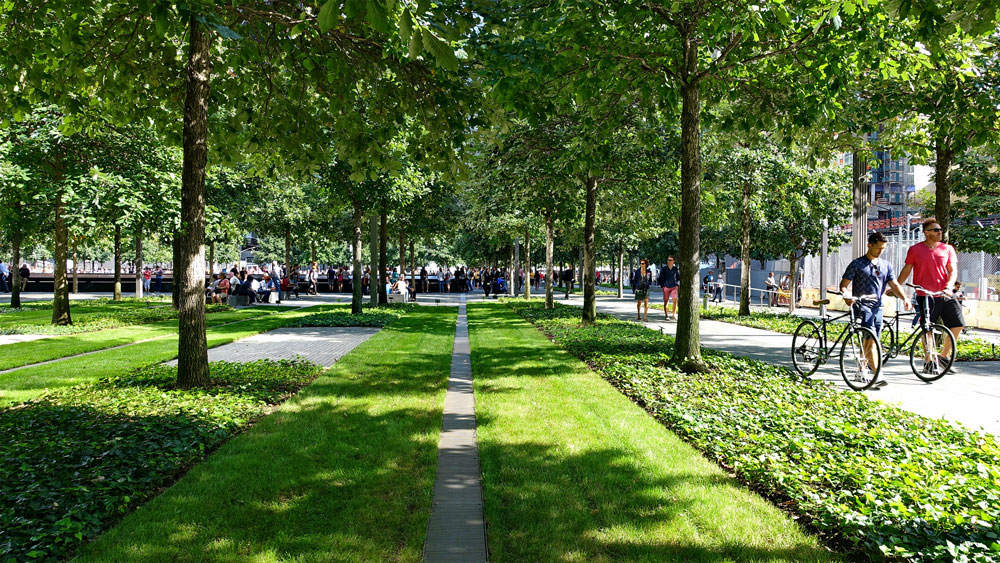
In various capacities, Walker has witnessed—and played a discernable role in—the Harvard GSD’s evolution. And from his unique vantage point, Walker recognizes the diverse, mind-expanding views amassed at the GSD as an enduring gift for students and alumni alike, even long after they have departed campus. As Walker notes, “though family and close friends”—many former students turned colleagues—”Harvard has kept me in touch with these things.”
- Search UNH.edu
- Search Undergraduate Admissions
Commonly Searched Items:
- Academic Calendar
- First-Year Students
- Transfer Students
- International Students
- Veterans & Non-Traditional Students
- Verto Wildcats Abroad Program
- Readmission and Reinstatement Information
- Check Application Status
- Admissions Forms and Resources
- Senior Checklist
- Test-Optional Policy
- Parent Checklist
- Net Price Calculator
- Financial Aid Resources
- Scholarship Information
- New England Regional Student Program (NERSP)
- The Wildcat Take - Admissions Blog
- Voices of Wildcats - Student Stories
- Wildcat Success
- Guided In-Person Tours
- Virtual Campus Tours
- Academic Sessions
- Shadow a Wildcat Day
- Transfer Student Visit Opportunities
- Prospective Student Visit Day
- Fall Open House
- Wildcats Across the Years (Virtual)
- Group Visits
- School Counselor Programs
- Meet Our Ambassadors
- Self-Guided Walking Tour
- UNH Comes to You
- Navigating Financial Aid
- COVID-19 FAQ
- Readmitted Students
- Admitted Student Visit Options
- UNH Near You
- Admitted Student Forms
- Changing Majors and Competitive Majors
- Find Your Admissions Counselor
- Request Information
- Application Decisions & Communication Policy
How to Visit Campus
Are you ready to plan your UNH campus visit and tour our campus? Prospective students have told us they love visiting UNH over the summer. You can grab an ice cream at the Campus Creamery, enjoy the beautiful weather and — the best part — see everything UNH has to offer with your own eyes .
What is a campus visit? Is a campus visit worth it? A college tour is the best way to see campus buildings and areas of student life with your own eyes and decide on the best college for you. Read on to learn how to plan your UNH visit and what it will include!
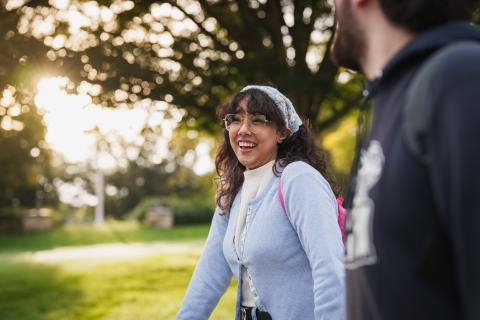
Why should I visit UNH?
Visiting UNH will enable you to see the campus for yourself , including residence halls, dining halls, classroom buildings, student life facilities and so much more. You’ll also be able to ask specific questions you may have about UNH and hear the perspective of a current student (your tour guide).
How can I sign up for a tour and information session?
Visit here to sign up for a tour and information session! You’ll be able to choose the date and time that work for you.
Who will lead my tour?
Your tour of UNH will be led by a current UNH student tour guide . These students love UNH and can’t wait to share with you everything about campus , talk about their UNH experience and answer all your questions !
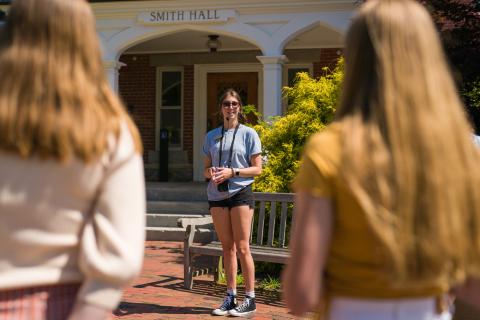
How long is a UNH campus tour?
Your tour (including a brief information session at the beginning) will last about 1 hour and 30 minutes total. At the end of this time, you will have the opportunity to ask your tour guide more questions and meet with admissions counselors in Smith Hall, our admissions building.
What will my campus tour be like?
You'll be walking a lot, so wear comfy shoes and dress for the weather! Your tour guide will stop at various indoor and outdoor locations around campus to talk about that location and answer any questions.
Tour stops may include:
- A residence hall and room
- The MUB (student union)
- The Hamel Recreation Center
- Dining areas
- Dimond Library
- An academic building & classrooms
What will my information session be like?
All tours start with a brief information session with UNH undergraduate admissions . This is your chance to learn some background information about our campus and location . It is also an opportunity to ask any questions you may have before starting the tour.
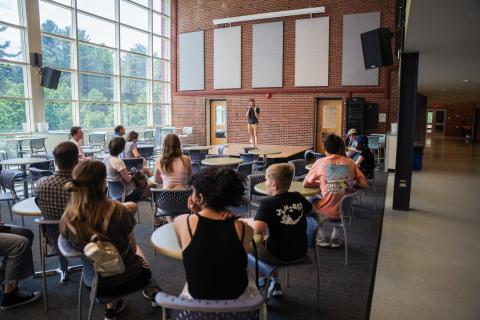
What should I ask on my tour?
Your campus tour is your chance to explore campus fully and learn more about the experience of a real student (your tour guide). Every question is a good question! Here are a few ideas if you're not sure what to ask your tour guide:
- "Why did you choose UNH?"
- "What's your favorite thing about UNH?"
- "How did UNH prepare you for deciding what you want to do after graduation?"
- "How have you found friends and community on campus?"
- "If we have time after the tour, what else do you recommend we check out at UNH and in Durham?"
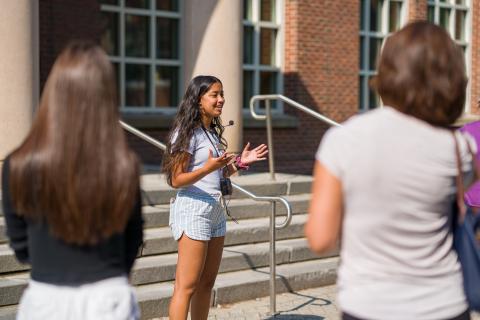
What if I can’t visit in person?
If you can’t visit UNH in person, visit this page to learn about other visit options and check out our virtual tour for a 360-degree experience!
You are going places. This summer, make UNH one of them!
- Sign up for a tour today
- Explore other visit options
- Navigate our campus virtual tour
related posts:
What you might not see on your campus tour.
Though our tours give an overview of the most important parts of campus, they don’t have time to cover everything. Let’s talk about some unique campus features and locations that are off the beaten path !
learn about our campus
- Wildcat Take
- Campus Tour
- Undergraduate Admissions
- Transfer Advisors by Major
- Transfer Credits

- Sustainability
- Embrace New Hampshire
- University News
- The Future of UNH
- Campus Locations
- Calendars & Events
- Directories
- Facts & Figures
- Academic Advising
- Colleges & Schools
- Degrees & Programs
- Undeclared Students
- Course Search
- Study Abroad
- Career Services
- How to Apply
- Visit Campus
- Costs & Financial Aid
- Graduate Admissions
- UNH Franklin Pierce School of Law
- Housing & Residential Life
- Clubs & Organizations
- New Student Programs
- Student Support
- Fitness & Recreation
- Student Union
- Health & Wellness
- Student Life Leadership
- Sport Clubs
- UNH Wildcats
- Intramural Sports
- Campus Recreation
- Centers & Institutes
- Undergraduate Research
- Research Office
- Graduate Research
- FindScholars@UNH
- Business Partnerships with UNH
- Professional Development & Continuing Education
- Research and Technology at UNH
- Current Students
- Faculty & Staff
- Alumni & Friends

COMMENTS
For information about Harvard College Admissions tours for prospective students, ... The mobile tour is designed to be accessed in-person on Harvard University's campus, starting at the Harvard Visitor Center, located at the Smith Campus Center in Harvard Square (1350 Massachusetts Ave, Cambridge, MA). It can also be viewed from the comfort ...
Harvard University Visitor Center. Harvard University established the Visitor Center in 1962 as the front door to the University, where students greet visitors from all over the world, answer questions about campus, and provide official tours of Harvard. Email [email protected].
The Harvard University Visitor Center offers in-person tours daily. Additional tour offerings include the self-guided historical tour on the Visit Harvard mobile app, available to download on iOS and Android devices. During business hours you may purchase a Self-Guided Tour Map for $3 available in multiple languages. Program Experience.
Location. 5 James Street. Cambridge, MA 02138. United States. Learn from current students, stroll through Harvard Yard, and discover historic Cambridge, Massachusetts. We offer daily information sessions and campus tours, Monday through Friday, starting at 9:30 am. Registration is required, so remember to sign up before you arrive.
We welcome participants with disabilities and are happy to make our online information sessions accessible for you. If you require a disability-related accommodation, please contact us at [email protected] or call 617-495-1551. Registration information will be used for planning purposes only.
The Harvard Admissions and Financial Aid Office hires undergraduate students to give campus tours and information sessions for prospective students who come to visit Harvard. Additionally, the undergraduates also work as greeters for other Admissions Office events, welcoming and directing students and their parents.
Before you embark on your Harvard campus tour, it's essential to familiarize yourself with Harvard's rich history. Established in 1636, Harvard University is the oldest institution of higher learning in the United States. It was founded by the Massachusetts Bay Colony intending to educate clergy and perpetuate the Puritan faith.
Harvard College Admissions Office and Griffin Financial Aid Office. ... please click here for additional information about ways that certain Harvard University Schools, Centers, units and controlled entities, including ... Use our Virtual Tour to discover spaces that aren't even available on an in-person campus tour, such as classrooms ...
The one-hour tour is free, but you do need to register in advance. Visiting parties are limited to groups of 5. For groups of 6 or more, please contact the Harvard University Visitor Center to arrange a visit. You can view the Harvard University visitors calendar for more details. If you are interested in touring the campus on your own, you can ...
The Admissions Office hosts MBA Program Open Houses—which include a group campus tour followed by an information session—throughout the year to help answer your questions about the MBA program and the admissions process. During the summer months, MBA Admissions staff members host these Open Houses while our students are off campus.
Harvard University. Visit the main campus in Cambridge, MA. The Office of the Committee on Admissions does not currently offer in-person campus tours to the public. We welcome the public to enjoy our virtual tours below:
Harvard's Campus Get tickets to our next game, hours and ... Celebrating the Class of 2024 Join the celebration for Harvard University's 373rd Commencement and explore the amazing scholarship of our graduates. Explore the ceremony and our graduates ... Visit Harvard Ideas and assistance for your trip to our campus. Tours; Maps and directions ...
Maine Footy and Saint Joseph's College of Maine Launch College Compass Clinics for Aspiring Soccer Players. Media day scheduled for Friday, May 24 th featuring Maine Footy 2024 roster & coaches. Portland, Maine — Maine Footy, the 2023 Franchise of the Year in the United Women's Soccer league, and Saint Joseph's College of Maine, are pleased to announce their new training program, College ...
Some researchers say that, despite that sobering data, dismissing the SAT and tests like it is shortsighted. Harvard Professor Raj Chetty, part of the Opportunity Insights team, told The New York Times the disparities in SAT scores by class and race are a "symptom, not a cause," of educational inequality in the United States.
5 James Street. Cambridge, MA 02138. United States. We have been closely monitoring the outbreak of COVID-19, and preparing to do our part to keep our community and our visitors healthy and safe. Therefore, it is out of an abundance of caution that we have decided to close our Visitor Center and suspend information sessions and campus tours ...
ARTS FIRST 2024 continues through Sunday, April 28. All are welcome. Dozens of arts events are taking place in venues across campus that remain open to the public. Events in Harvard Yard are accessible to Harvard University ID holders only. For details on the ARTS FIRST Performance Fair on Saturday, April 27, review event listings in the ...
The ban on R.O.T.C on campus continued. Harvard said the new reason was to protest the military's "anti-gay" policies. Though Harvard finally rescinded this ban after 42 years, the school ...
You may also attend the Harvard College general information session and tour. Please note that registration is required for both the SEAS Tour and Harvard College Information Session & Tour so be sure to register as soon as you have a visit date in mind. Email: [email protected]. Phone: 617 495 3163.
Yard Access Guidelines for Commencement Day: Thursday, May 23, 2024. Gates open at 6:45 AM and all guests should be seated by 8:30 AM. All guests must have a ticket to enter the Yard for Commencement Day exercises. Graduating students must have regalia and have both their lanyard and active Harvard ID to enter the Yard.
For almost 70 years, the landscape architect Pete Walker (MLA '57) has maintained strong ties with the Harvard Graduate School of Design (GSD), a relationship that has evolved alongside his career, from student to world-renowned designer and GSD benefactor. Since 2004, the Peter Walker & Partners Fellowship, conferred on Class Day, has ...
Explore other visit options; Navigate our campus virtual tour ; related posts: What You Might Not See on Your Campus Tour. Though our tours give an overview of the most important parts of campus, they don't have time to cover everything. Let's talk about some unique campus features and locations that are off the beaten path! learn about our ...